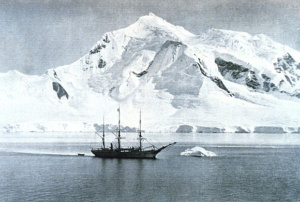Early Theories and Exploration
Explore the fascinating history of Antarctica, from early discovery to modern exploration. Learn about key expeditions, scientific research, and the continent’s role in global climate studies.
- Ancient Speculations:
Ancient Greeks hypothesized the existence of Terra Australis, a southern landmass, to balance the northern continents.
- First Sightings:
1820: The first confirmed sighting of Antarctica is credited to a Russian expedition led by Fabian Gottlieb von Bellingshausen and Mikhail Lazarev.
The Heroic Age of Antarctic Exploration (1897-1922)

- Belgian Expedition (1897-1899):
Led by Adrien de Gerlache, it was the first to winter in Antarctica, providing valuable scientific data. - British Expeditions:
1901-1904: Led by Robert Falcon Scott, the Discovery Expedition laid the groundwork for future explorations.
1910-1913: Scott’s Terra Nova Expedition reached the South Pole but tragically perished on the return journey.
Modern Scientific Exploration
- Antarctic Treaty (1959):
Established Antarctica as a scientific preserve, banning military activity and promoting international cooperation. - International Geophysical Year (1957-1958):
Marked a significant scientific collaboration, leading to major discoveries about Antarctica’s climate and geology.
Interesting Facts About Antarctica
- Coldest Place on Earth:
Temperatures can plummet to -128.6°F (-89.2°C), recorded at the Soviet Vostok Station. - Dry Valleys:
Some areas of Antarctica haven’t seen precipitation in nearly 2 million years, making them one of the driest places on Earth. - Volcanoes:
Antarctica is home to Mount Erebus, the southernmost active volcano on the planet. - Unique Ecosystem:
Despite harsh conditions, life thrives, including resilient microorganisms, seals, penguins, and diverse marine life. - Ice and Water:
Antarctica holds about 70% of the world’s fresh water in its ice sheets, which also represent about 90% of the planet’s ice.
Conclusion
Antarctica, the enigmatic southern continent, is a land of extremes and mysteries. From its early speculative existence to being a hub of international scientific research, its history is a testament to human curiosity and resilience. With its extreme climate, unique ecosystems, and critical role in global climate patterns, Antarctica continues to captivate scientists and adventurers alike.


